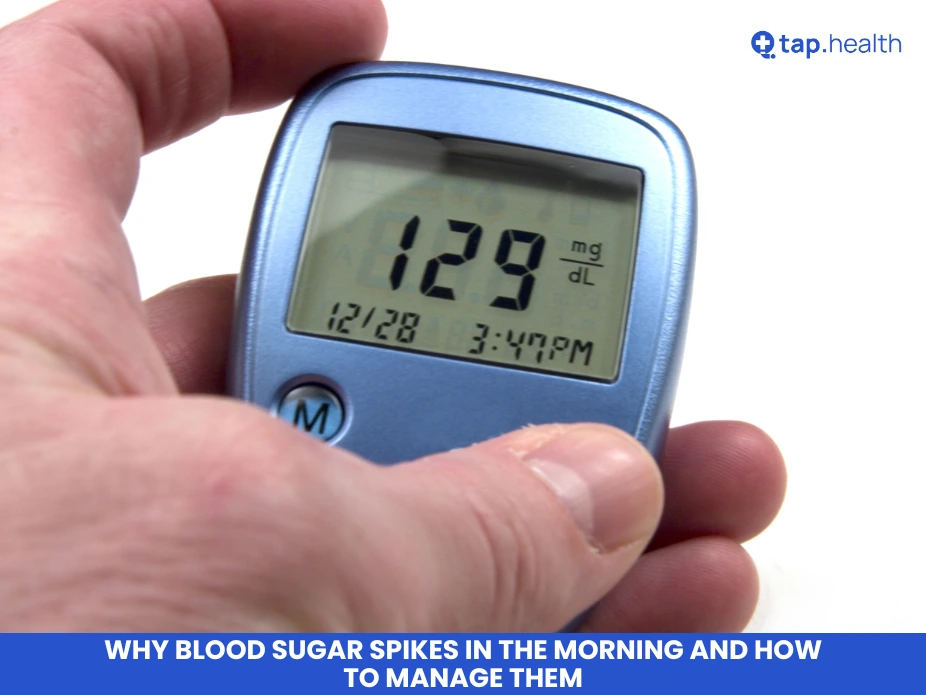Blood sugar spikes in the morning are a common concern for many individuals, especially those managing diabetes or prediabetes. These early-morning blood sugar surges are often perplexing and can be frustrating. Understanding why these spikes occur and how to manage them can help improve your overall health and reduce the risk of long-term complications like heart disease, kidney damage, and nerve issues.
In this article, we will explore the causes of morning blood sugar spikes, known as the “dawn phenomenon” and “Somogyi effect,” and provide actionable tips on how to manage them. This information is based on scientific research, expert opinions, and real-life examples.
What Are Blood Sugar Spikes?
Blood sugar, or glucose, is the primary energy source for the body. However, excessive blood sugar levels can be harmful, especially for individuals with diabetes. Blood sugar spikes occur when glucose levels rise too quickly or to abnormal levels, which can lead to short-term and long-term health issues.
When blood sugar levels fluctuate unexpectedly, they can cause fatigue, mood swings, headaches, and difficulty concentrating. Managing these spikes, especially in the morning, is vital for maintaining overall health.
Why Blood Sugar Spikes in the Morning
There are several reasons why blood sugar levels may spike in the morning, even for individuals who are generally managing their blood sugar well. The primary causes include the “dawn phenomenon” and the “Somogyi effect.”
The Dawn Phenomenon
The dawn phenomenon refers to the natural increase in blood sugar levels that occurs in the early morning hours, usually between 2 a.m. and 8 a.m. This rise is typically seen in individuals with diabetes, but it can affect anyone.
Why it happens: During the night, the body goes through several hormonal changes. One of these changes involves the release of hormones such as cortisol, growth hormone, and glucagon. These hormones are part of the body’s natural process of waking up and preparing for the day. They cause the liver to release stored glucose into the bloodstream, which can lead to higher-than-normal blood sugar levels in the morning.
For people with diabetes, the body may not produce enough insulin to counteract this rise in blood glucose, leading to a spike. People without diabetes usually have enough insulin to manage these changes, so the blood sugar spike is not typically as severe.
The Somogyi Effect
The Somogyi effect, also known as “rebound hyperglycemia,” occurs when blood sugar drops too low during the night (hypoglycemia) and the body responds by releasing glucose to raise blood sugar levels. This rebound effect can cause an elevated blood sugar level in the morning.
Why it happens: If someone takes too much insulin before bed or skips a nighttime snack, their blood sugar levels can drop too low during sleep. In response, the body releases counter-regulatory hormones like glucagon and adrenaline, which prompt the liver to release glucose. This release can lead to an overshoot in blood sugar levels, causing them to rise dramatically in the morning.
Insulin Resistance
Another contributing factor to morning blood sugar spikes is insulin resistance. Insulin resistance occurs when the body’s cells become less responsive to insulin, leading to higher blood sugar levels. In individuals with Type 2 diabetes, insulin resistance is a common issue.
Why it happens: Insulin resistance can worsen overnight when the body is not actively processing food or using glucose. This leads to an accumulation of glucose in the bloodstream, contributing to higher blood sugar levels in the morning.
How to Manage Blood Sugar Spikes in the Morning
Managing morning blood sugar spikes involves a combination of dietary changes, lifestyle adjustments, and, in some cases, medication. Here are some strategies to help keep blood sugar levels stable throughout the night and into the morning.
1. Monitor Your Blood Sugar Levels Regularly
The first step in managing blood sugar spikes is to monitor your blood glucose levels regularly. This helps you understand how your body reacts to food, exercise, and medication. Keeping track of your blood sugar at different times of the day can help identify patterns, including morning spikes.
How it works: By checking your blood sugar before bed, in the morning, and after meals, you can gather useful data that can guide your management strategy. If you notice consistent spikes in the morning, it might be time to consult with your healthcare provider for further adjustments to your treatment plan.
2. Adjust Your Evening Meal
What you eat in the evening plays a significant role in how your body handles blood sugar during the night. A large, high-carb meal can cause an increase in blood sugar levels, which may exacerbate the dawn phenomenon.
How to manage:
- Choose a balanced dinner with a mix of healthy fats, lean protein, and low-glycemic carbohydrates.
- Avoid large portions of carbohydrates close to bedtime. Instead, opt for complex carbs like whole grains or vegetables, which are digested more slowly.
- Include a small, protein-rich snack before bed (like nuts, yogurt, or cheese) to help stabilize blood sugar overnight.
3. Exercise Regularly
Exercise is one of the most effective ways to improve insulin sensitivity and control blood sugar levels. Engaging in physical activity, especially after meals, helps your body process glucose more efficiently.
How it works:
- Aim for at least 30 minutes of moderate-intensity exercise most days of the week.
- Include both aerobic exercise (like walking or cycling) and resistance training (like weightlifting or bodyweight exercises) to improve muscle mass and enhance insulin sensitivity.
- Be cautious about exercising too close to bedtime, as intense workouts might temporarily raise cortisol levels and affect your sleep quality.
4. Take Medications as Prescribed
For individuals with diabetes, medications such as insulin or oral medications (like metformin) are often necessary to manage blood sugar levels. If you notice that morning blood sugar spikes are not improving with lifestyle changes, your doctor may adjust your medication regimen.
How it works:
- Insulin therapy may be adjusted to prevent blood sugar from rising overnight.
- Other medications, like GLP-1 agonists or SGLT2 inhibitors, may help reduce blood sugar levels in the morning.
- If you experience the Somogyi effect, your doctor may suggest adjusting your insulin doses or timing.
5. Get Enough Sleep
Sleep plays a crucial role in regulating hormones that affect blood sugar levels. Poor sleep or insufficient rest can disrupt the balance of insulin, cortisol, and other hormones, leading to blood sugar imbalances.
How it works:
- Aim for 7-9 hours of quality sleep each night.
- Practice good sleep hygiene by maintaining a regular sleep schedule, avoiding caffeine or alcohol before bed, and creating a relaxing sleep environment.
6. Manage Stress Levels
Chronic stress can elevate cortisol levels, which in turn can raise blood sugar levels. Managing stress is essential for controlling blood sugar fluctuations, including morning spikes.
How to manage:
- Practice stress-reducing activities like meditation, yoga, deep breathing exercises, or spending time in nature.
- Regular physical activity can also help reduce stress and improve insulin sensitivity.
Real-Life Scenarios
Scenario 1: Lisa’s Morning Blood Sugar Struggles
Lisa, a 55-year-old woman with Type 2 diabetes, noticed that her blood sugar levels were consistently high in the morning. Despite taking her insulin, her blood sugar would peak between 6 a.m. and 8 a.m. After tracking her meals and exercise, Lisa realized that she was eating a large meal late at night, which might have contributed to her morning spike. She decided to adjust her evening meal to include lean protein and fiber-rich vegetables, and also started taking a walk after dinner. Within a few weeks, her morning blood sugar levels improved significantly.
Scenario 2: John’s Rebound Effect
John, a 40-year-old man with Type 1 diabetes, experienced frequent morning blood sugar spikes. Upon reviewing his insulin regimen with his doctor, he discovered that his nighttime insulin dose was too high, causing a drop in blood sugar during the night and triggering a rebound effect in the morning. His doctor adjusted his insulin dosage, and John started eating a small snack before bed. Over time, his morning blood sugar levels stabilized.
Expert Contributions
Dr. Sarah Jones, Endocrinologist
“The dawn phenomenon is a natural response, but for individuals with diabetes, it can be problematic. The key is balancing insulin production and glucose release. Regular monitoring and adjustments to diet and medication can help prevent morning blood sugar spikes.”
Dr. Alan Roberts, Diabetes Specialist
“Stress management, sleep, and physical activity are essential components of managing blood sugar levels. By focusing on a holistic approach, individuals can reduce the occurrence of blood sugar spikes in the morning and improve overall metabolic health.”
Recommendations Grounded in Proven Research and Facts
Scientific studies and clinical guidelines support the strategies outlined above. Research has shown that:
- Dietary changes can significantly impact blood sugar control, including reducing the impact of the dawn phenomenon (Diabetes Care).
- Exercise improves insulin sensitivity and helps control blood sugar fluctuations (Journal of Clinical Endocrinology & Metabolism).
- Stress management and quality sleep are critical factors in reducing cortisol levels and preventing blood sugar spikes (Diabetes Research and Clinical Practice).
Factual and Reliable Information
This article draws on well-established research and expert recommendations. For more in-depth reading, you can refer to the following sources:
FAQs on
Q1: Why does my blood sugar spike in the morning even though I haven’t eaten?
Morning blood sugar spikes are often due to the dawn phenomenon, a natural process where hormones like cortisol and growth hormone raise glucose levels to prepare for the day.
Q2: Can the Somogyi effect cause morning blood sugar spikes?
Yes, the Somogyi effect happens when blood sugar drops too low during the night, prompting a rebound spike in the morning.
Q3: How can I prevent morning blood sugar spikes?
Manage your evening meals, adjust your insulin regimen if necessary, exercise regularly, get enough sleep, and reduce stress.
Q4: Should I exercise in the morning to control blood sugar?
Morning exercise can help manage blood sugar levels, but consistency throughout the day is key. Both aerobic and resistance exercises are beneficial.



